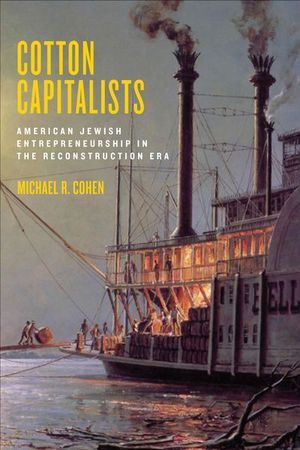Cotton Capitalists
Published by NYU Press
“Effectively argues that ethnic networks were important to...Jewish businesses as they participated in the cotton economy.” —Choice
In the nineteenth century, Jewish merchants created a thriving niche economy in the United States’ most important industry—cotton. Cotton Capitalists argues that Jewish merchants’ status as a minority fueled their success by fostering ethnic networks of trust. Trust in the nineteenth century was the cornerstone of economic transactions, and this trust was largely fostered by ethnicity. Much as money flowed along ethnic lines between Anglo-American banks, Jewish merchants in the Gulf South used their own ethnic ties with other Jewish-owned firms in New York, as well as Jewish investors across the globe, to capitalize their businesses. They relied on these family connections to direct Northern credit and goods to the war-torn South, avoiding the constraints of the anti-Jewish prejudices which had previously denied them access to credit, allowing them to survive economic downturns.
These American Jewish merchants reveal that ethnicity matters in the development of global capitalism. The story of Jews in the American cotton trade is far more than the story of American Jewish success and integration—it is the story of the role of ethnicity in the development of global capitalism.
“This eloquent study reminds us that we cannot fully understand the Souths economic revival in the age of reconstruction without looking at the critical role played by immigrant Jewish merchants.” —Rebecca Kobrin, Knapp Associate Professor of American Jewish History, Columbia University
“Michael R Cohens...well-written book, reveals how...Jews played a key role in building the cotton economy of the South.” ―The Jewish Chronicle
In the nineteenth century, Jewish merchants created a thriving niche economy in the United States’ most important industry—cotton. Cotton Capitalists argues that Jewish merchants’ status as a minority fueled their success by fostering ethnic networks of trust. Trust in the nineteenth century was the cornerstone of economic transactions, and this trust was largely fostered by ethnicity. Much as money flowed along ethnic lines between Anglo-American banks, Jewish merchants in the Gulf South used their own ethnic ties with other Jewish-owned firms in New York, as well as Jewish investors across the globe, to capitalize their businesses. They relied on these family connections to direct Northern credit and goods to the war-torn South, avoiding the constraints of the anti-Jewish prejudices which had previously denied them access to credit, allowing them to survive economic downturns.
These American Jewish merchants reveal that ethnicity matters in the development of global capitalism. The story of Jews in the American cotton trade is far more than the story of American Jewish success and integration—it is the story of the role of ethnicity in the development of global capitalism.
“This eloquent study reminds us that we cannot fully understand the Souths economic revival in the age of reconstruction without looking at the critical role played by immigrant Jewish merchants.” —Rebecca Kobrin, Knapp Associate Professor of American Jewish History, Columbia University
“Michael R Cohens...well-written book, reveals how...Jews played a key role in building the cotton economy of the South.” ―The Jewish Chronicle
BUY NOW FROM
COMMUNITY REVIEWS
